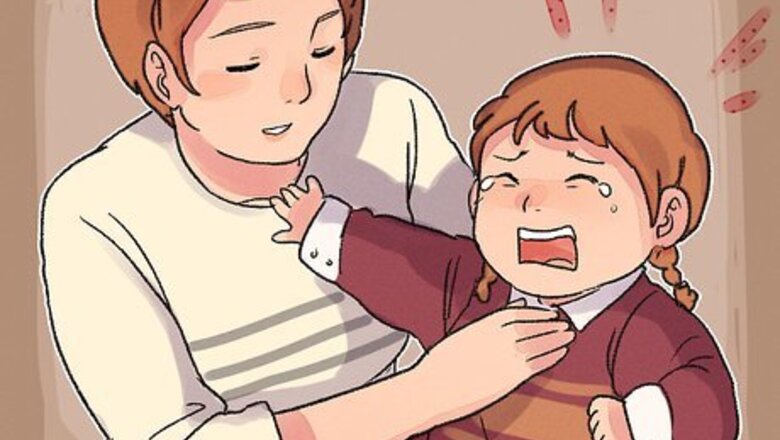
views
Talking it Through
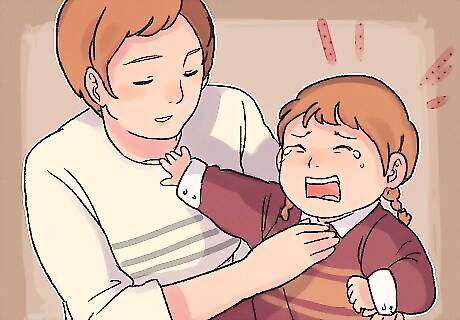
Remain calm enough to handle the tantrum properly. The worst thing parents can do is have a temper tantrum over their child's temper tantrum. Children need a calming influence, especially during a tantrum, and if you can’t provide that, you can’t expect them to calm down. Take a few deep breaths and wait at least a few seconds before deciding on a response.
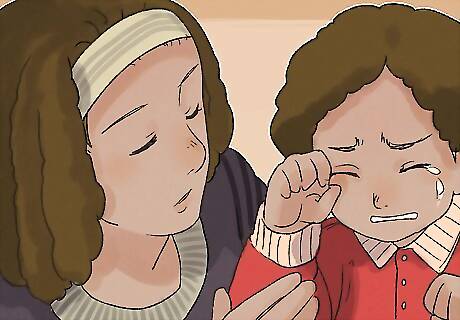
Make sure the child has what they need. Remember that your child's tantrum is not necessarily a way to "get their way", but could be the result of frustration, lack of needed attention from you, or even a physical problem, like low blood sugar, pain or digestive problems. Maybe your child is teething, has a dirty diaper, or needs a nap. In cases like these, don’t try to negotiate with the child, but simply provide what is needed and the tantrum will subside. It’s very common for kids to throw tantrums when they’re sleepy. A regularly scheduled naptime can help prevent recurring tantrums if this seems to be the problem. When you’re out and about with your child, have a healthy snack available at all times, so they don’t end up throwing a tantrum out of hunger.

Ask what’s wrong. Kids just want to be heard, and throwing a tantrum is often the best way they know how to express themselves. Taking your child seriously by asking what’s wrong and actually listening to the response can help. Hold your child and give them your full attention so they have time to explain. This is not to say that you need to give in to whatever your child wants. The point is simply to hear your child out in a respectful way, just as you would anyone else. Whether your child wants a new toy or doesn’t want to go to school, they should have the right to express that.
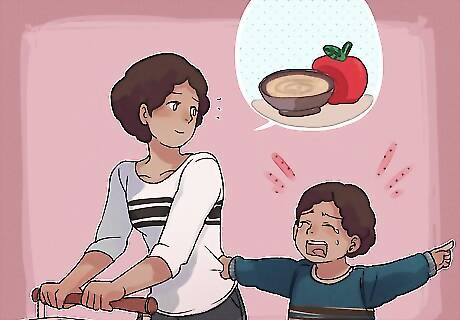
Give clear explanations instead of just saying "no". Many parents just say “no” and “because I said so” instead of explaining the reason why, but that’s frustrating for kids. You don’t have to give a long-winded explanation, but providing a reason for your actions will help the child make sense of things and feel more in control of the situation. For example, if you’re in the grocery store and your child throws a tantrum because they want sugary cereal, remind them that they like oatmeal and fruit for breakfast, so there’s no need to buy cereal, too.

Offer your child a choice of coping strategies. For example, your child wants ice cream, but it's too close to dinner. Say: "Alexis, you're really getting upset now. Calm down or you'll have to go to your room." You have given them a choice: either control themselves or, if they can't, retreat to a place where they won't influence others. If they make the right choice (to calm down), remember to compliment them: "You asked for ice cream and I said no. I want to thank you for taking no for an answer." Conversely, have consequences and enforce them if they choose to get upset. Guide them to their room and firmly insist that they remain there until they calm down, for example. This is easier with a two-year-old than with an eight-year-old, so the younger you begin the learning process the better.
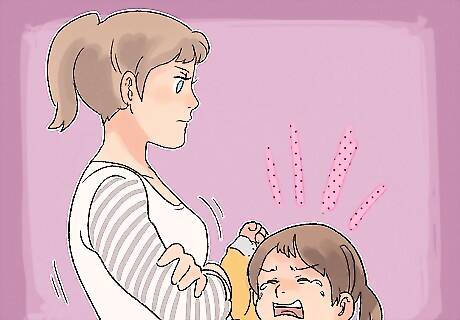
Hold your ground. Be empathetic but firm when you talk with your child, and once you’ve given a calm explanation, don’t back down. Your child may or may not calm down right away, but they will remember that throwing a tantrum doesn’t lead to satisfactory results. Next time your child wants something, they will be less likely to throw a tantrum.
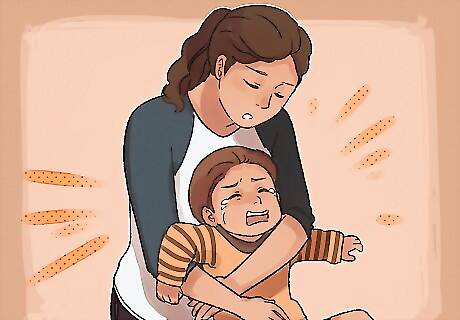
Take steps to prevent injury. Some children can become quite animated during a tantrum. If this occurs, remove dangerous objects from the child’s path or steer the child away from danger. Try to avoid restraining a child during a tantrum, but sometimes this is necessary and comforting. Be gentle (do not use excessive force), but hold them firmly. Speak reassuringly to the child, especially if the tantrum is the result of disappointment, frustration, or unfamiliar surroundings.
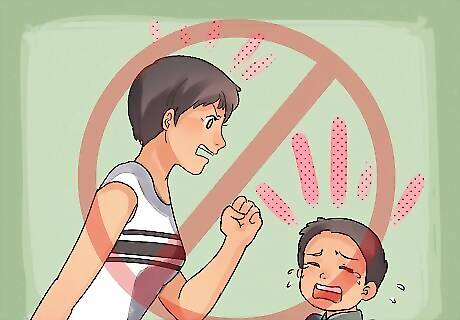
Don’t lose your own temper. It’s important to model the behavior you want to see for your child. If you lose it and start yelling and throwing an adult-style tantrum of your own, your child will see this type of behavior as something that’s acceptable at your house. It’s not easy to do, but staying calm and collected is the best thing you can do for yourself and your child. Take a few minutes to cool off by yourself if you need to. Get your spouse or other responsible person to look after the child while you calm down. Put your child in their room with a gate in front of the door if necessary. Do not spank or yell at your child. Losing control of yourself in this way will only make your child feel confused and scared of you. It won’t lead to a healthy and trusting relationship. Modeling good ways to communicate and handle frustration within your relationship with your partner is also important. Avoid fighting in front of your child, or getting upset when you don’t get your way.
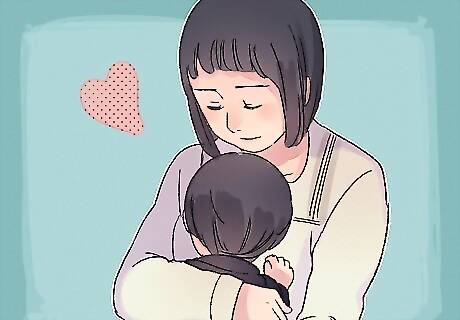
Help your child feel loved no matter what. Sometimes kids throw tantrums because they just want some extra love and attention. Withholding love is never a good policy when it comes to disciplining a child. No matter what, your child should know that you love them no matter what. Avoid berating your child or saying “I’m so disappointed in you” when they throw a tantrum. Hug your child and say “I love you,” even if you’re very frustrated with their behavior.
Trying Time Out (for Young Children)
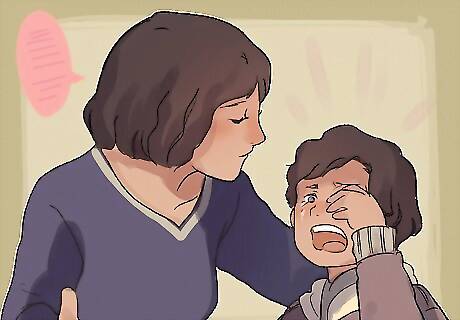
Use time out during a meltdown. Avoid trying to reason with any child who is in the middle of a full-blown tantrum. Give them time to vent. Instead, give the child phrases to express the emotions that they are experiencing. Say phrases like, "You must be really tired after such a long day," or, "You must feel frustrated that you can't have what you want right now." This not only will help the child verbalize this later, but shows empathy without having to give in. At this point, you may find that your best option is giving the child space until they calm down.

Tell your child it’s “time out” or “quiet time”. If your toddler is having a complete meltdown, and there’s no way they will be responsive to a rational conversation, sometimes quiet time is the best method. Tell them it’s time to be quiet until they can calm down and feel better. Remain calm yourself to model good behavior for your child. Don’t use quiet time as a threat or punishment, but rather as a way to give your child space so they can calm down.
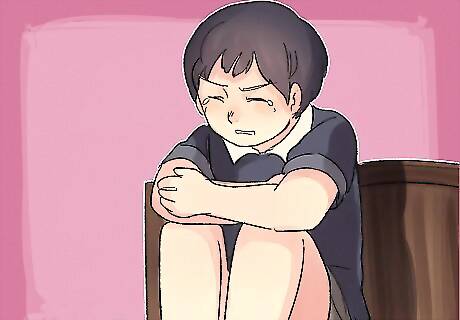
Place them in a safe spot. The child’s bedroom or another safe place in the house where you feel comfortable leaving them alone for a little while is best. The spot should be free of distractions such as a computer, TV or handheld video game. Choose a quiet, peaceful place that the child associates with feeling calm. Don’t lock the child in a room. This can be dangerous and will be interpreted as a punishment.
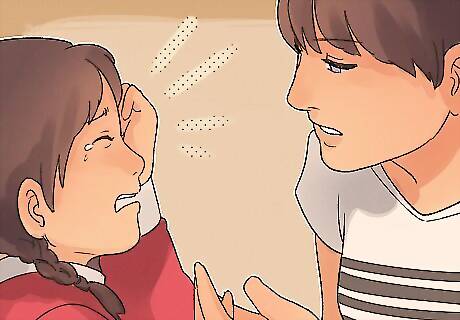
Explain to the child that you will talk to them when they calm down. This will help your child to understand that you are ignoring them because their behavior is unacceptable, not because you don’t care about them. When the child calms down, fulfill your part of the bargain by discussing the tantrum and the child’s concerns.
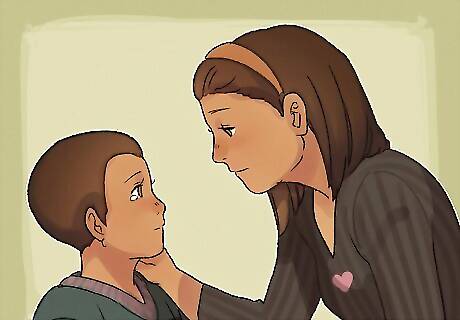
Have a talk when it's time. When your child is no longer having a fit, have a conversation about what happened. Without berating your child or taking an accusatory tone, ask why they were upset. Provide a clear explanation of your side of the story. It’s important not to treat your child as the enemy, even if you’re upset with them. Hug your child and speak lovingly even as you’re explaining that we can’t always get our way.

Be consistent. Kids need structure in order to feel safe and in control of their lives. If they’re never sure what will happen if they behave a certain way, they’ll start acting out. Use “time out” or “quiet time” each time your child throws a tantrum. They will soon learn that screaming and kicking aren’t as effective as talking things through.
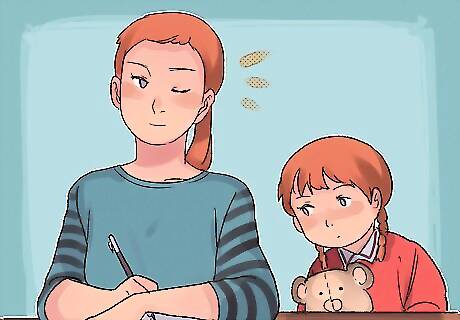
Try the journaling time out trick. If you don’t feel comfortable putting your child in a different room or spot, you can still facilitate a time out of sorts by shifting your attention elsewhere. When your child throws a tantrum, tell them you’re going to write about it. Take out a journal and write down what happened and how you feel. Ask your child to tell you how they feel so you can write that down, too. Your child will want to be involved in what you’re doing, and will soon forget to scream and cry.
Knowing When to Get Professional Advice
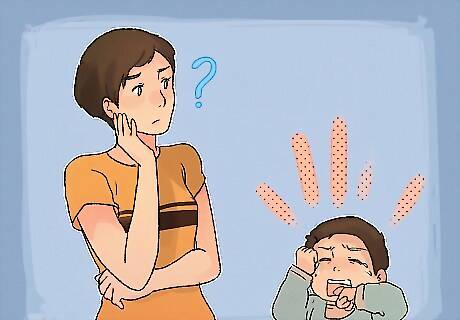
See if you’re getting through to your child. Different children respond to different disciplinary methods. Try a few different things and see what seems to work. If your child keeps throwing tantrums no matter what you do, you might want to get outside assistance from a doctor or therapist, who can provide more ideas that suit the specific needs of your child.

See if the tantrums are related to an environmental factor. Certain environmental stimulants might be causing your child to have more tantrums than normal. Sometimes kids have a sensitivity to food (especially sugar), light, big crowds, music, or other factors that irritate them and cause them to break down in frustration. Observe the times when your child has tantrums, and see if you think the tantrums are connected to something in the environment. Take away the stimulant and see if that helps. Get professional advice if you’re having trouble figuring out what’s causing the tantrums.
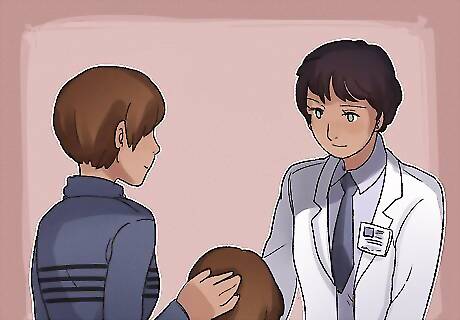
See if the tantrums persist as the child gets older. Most kids eventually outgrow throwing tantrums when they learn other effective forms of communication. If your child keeps throwing tantrums well past the toddler stage, there may be something going on that needs to be addressed. Consider taking your child to a doctor or therapist to see if there’s a deeper issue at hand. Take your child to the doctor if tantrums are frequent or violent. If your child throws a tantrum multiple times a day, or if the tantrums are particularly violent and exhausting, it’s a good idea to have your child meet with a professional to find out if your child has a need that’s not being met. Violent, frequent tantrums may be a symptom of a developmental issue.











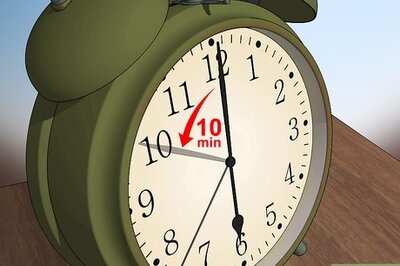




Comments
0 comment